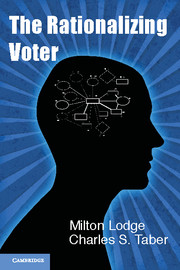Book contents
- Frontmatter
- Contents
- List of Tables
- List of Figures
- Preface
- 1 Unconscious Thinking on Political Judgment, Reasoning, and Behavior
- 2 The John Q. Public Model of Political Information Processing
- 3 Experimental Tests of Automatic Hot Cognition
- 4 Implicit Identifications in Political Information Processing
- 5 Affect Transfer and the Evaluation of Political Candidates
- 6 Affective Contagion and Political Thinking
- 7 Motivated Political Reasoning
- 8 A Computational Model of the Citizen as Motivated Reasoner
- 9 Affect, Cognition, Emotion
- Bibliography
- Index
4 - Implicit Identifications in Political Information Processing
Published online by Cambridge University Press: 05 March 2013
- Frontmatter
- Contents
- List of Tables
- List of Figures
- Preface
- 1 Unconscious Thinking on Political Judgment, Reasoning, and Behavior
- 2 The John Q. Public Model of Political Information Processing
- 3 Experimental Tests of Automatic Hot Cognition
- 4 Implicit Identifications in Political Information Processing
- 5 Affect Transfer and the Evaluation of Political Candidates
- 6 Affective Contagion and Political Thinking
- 7 Motivated Political Reasoning
- 8 A Computational Model of the Citizen as Motivated Reasoner
- 9 Affect, Cognition, Emotion
- Bibliography
- Index
Summary
In Chapter 3, we documented the automaticity of affect toward political candidates, groups, and issues. We turn now to the question of political and social identifications and the implications of automatic intergroup feelings and stereotypes for political information processing. Ethnocentrism and group-based prejudice have long been thought to originate in fundamental categorization processes. More generally, we expect that our basic political attitudes and beliefs will be influenced by unconscious group categorization and identification processes. That so, we expect automatic group identifications to exert a strong pull on support for parties, candidates, and political issues outside of a citizen's awareness.
This chapter reports multiple experimental tests of the hot cognition hypothesis for ideological, partisan, in-group, and out-group identifications. Our expectation, in line with the symbolic politics perspective of Kinder and Sears (1981; Sears, 2001; Sears and Henry, 2003), and our own emphasis on the primacy of affect in political judgment, is that the “simple” act of categorizing oneself or others as a member of this or that group is not so simple after all, as it engages both cognitive and affective processes that prove to be impossible to disentangle. From our hot cognition perspective, the labeling of one's self or others as a Democrat, Independent, or Republican, man or woman, black, white, or Asian is affectively charged, spontaneously triggering a positive self-to-in-group labeling effect and typically a less-than-positive or even negative affective evaluation of the out-group.
- Type
- Chapter
- Information
- The Rationalizing Voter , pp. 94 - 114Publisher: Cambridge University PressPrint publication year: 2013



